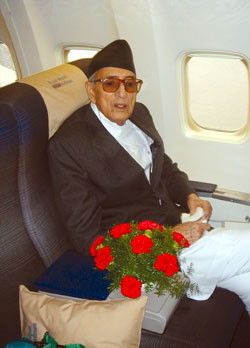Prime Minister Girija Prasad Koirala had three main points on his agenda as he landed in New Delhi on Tuesday evening:
. Firm up a comfortable economic package to stabilise government and kick-start reconstruction
. Reassure Indian authorities of the stability of the seven party alliance government
. Address evident Indian nervousness about the Maoists
The package that the Indian side offered in talks with Finance Minister Ram Sharan Mahat was unparalleled: waiver of NRs 1.6 billion of pending payment for military hardware, rescheduling Nepal Oil Corporation's Rs 5 billion debt to the IOC, a Rs 7.3 billion development package plus doubling of the amount set aside for local projects under the Indian Embassy in Kathmandu.
At a time when most Western donors are in a watch-and-wait mode, India also offered a nearly Rs 2 billion outright grant in cash. "We have never provided such budgetary support to any other country," a senior South Block official told us.
A new beginning for Indo-Nepal relations
|
|
| TRAVELLING ROYAL: Girija Prasad Koirala on board flight RA 217 to New Delhi on Tuesday. |
India attached great importance to the visit as evidenced by Prime Minister Manmohan Singh taking the unprecedented step of coming to the airport to greet Koirala on Tuesday.
He told a visibly touched Koirala that he could not do less for one of Asia's "seniormost statesmen". But Indian media was distracted by the case of young Rahul Mahajan's run-in with cocaine and champagne to pay much attention.
Severely weakened by a failing right lung, 84-year-old Koirala was mostly bound to the Imperial Hotel where the Indian side had put up the 42-member delegation from a newly democratic Nepal.
Aside from immediate aid and debt write-offs, the Nepali delegation has also discussed hydropower projects to meet Nepal's own urgent demand. There is hope Nepal can build on this for joint river projects in future. Full details are to be unveiled in a joint communiqu? on Friday, and at press time New Delhi hadn't said no to waiving a four percent countervailing duty that India places on Nepali products, which Nepali business has been seeking.
India has asked for a list of Nepali manufacturers, so third country products aren't fobbed off as export to India. Bangladesh has reportedly also approached India for similar consideration which is said to have put Delhi in a bind.
The South Block official conceded that India was trying to be less prescriptive in its relationship with Nepal, with the promised assistance to be used according to Nepal's defined priorities in highways, rural infrastructure, public health and education. Knowing of Kathmandu's sensitivities and the transitional nature of the present government, the Indian side resisted attempts by Nepali officials to ink in reference to hydropower projects.
Minister of State for Foreign Affairs Anand Sharma and Man Mohan Singh's National Security Adviser M K Narayanan are known to have expressed concern about the Maoists in separate meetings with Koirala. ''The Indians seem nervous about the rebels being seen to be at par with the state," one Nepali official told us. "Disunity within the seven alliance can only help the Maoists."
Indeed, a Ministry of External Affairs official also confirmed that this was his government's position on the rebels. "The seven party alliance government must deal with the Maoists from a position of strength so that the rebels move towards decommissioning of arms and a free and fair election to the constituent assembly. This process must be accelerated if peaceful politics is to be consolidated in the districts," he said.
New Delhi, however, remained firmly against any kind of United Nations facilitation of peace talks between the government and the Maoists. It would prefer to see the United Nations as observer rather than monitor of the constituent assembly elections. However, Indian officials conceded that the UN had the expertise and credibility required for the 'management of arms' before the elections.
The Maoist leadership is anxious for the release of more than 130 of its comrades presently in custody in India, some of them senior central committee members. But Delhi didn't seem to be in any great hurry to go down this road. Said one Indian official, "We see the rebels in jail as a bargaining tool that the government of Nepal needs during the negotiations."
"When asked to decide, India will of course side with the political parties," explained Indian political scientist and Nepal expert S D Muni. "New Delhi wants the Maoists to be mainstreamed but how this is to be done is up to Nepal's political parties. Girija Prasad Koirala is powerful today like never before and it his responsibility to ensure that the parties in his alliance do not complicate the peace process."
The enormous weight put by the Nepali side on Koirala's New Delhi trip and the extreme sensitivity to what the Indian side has to say is indicative of the unfinished Nepali agenda of building a competent, independent India policy.
The hope is that the self-confidence exhibited by the Nepali people during the April Uprising will also translate into Kathmandu's assertive engagement with New Delhi. Over the decades and till today, this engagement has been marked by two extremes: knee-jerk anti-Indianism and supplication.



